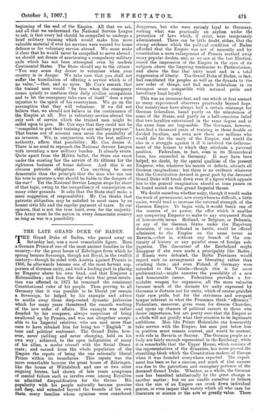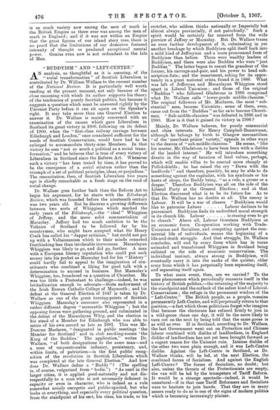THE LATE GRAND DUKE OF BADEN.
THE Grand Duke of Baden, who passed away on Saturday last, was a most remarkable figure. Born a German Prince of one of the most ancient families in the Country—for the great house of Ziihringen from which he sprang became Sovereign, though not Royal, in the twelfth century—though he sided with Austria against Prussia in 1866, he afterwards became one of the most fervent sup- porters of German unity, and took a leading part in placing an Emperor above his own head, and that Emperor a Hohenzollern ; and from the day when that great revolu- tion was effected in 1871 he remained the consistent Constitutional ruler of his people. Thus proving to all Germany that it was possible to be liberal yet remain a Sovereign, he helped by his example and advice to soothe away those deep-rooted dynastic jealousies which for many years threatened the smooth working Of the new order of affairs. His example was rather dreaded by his compeers, always suspicious of being swallowed up by Prussia, and was not altogether accept- able to his Imperial relatives, who are said more than once to have rebuked him for being too " English " in tone and political sentiment. The Grand Duke, how- ever, never yielding and never changing, held on his olve. way ; achieved, to the open indignation of many Of his allies, a modus vivendi with the Social Demo- crats ; and earned from the whole population of the Empire the repute of being the one rationally liberal Prince within its boundaries. This repute was the more remarkable because the great house of Zahringen, like the house of Wittelsbach and one or two other reigning houses, had shown of late yeara symptoms of mental failure such as involve even among Royalties an admitted disqualification for the throne. His popularity 'with his people naturally became genuine and deep, and extended beyond the bounds of his own State, many families whose opinions were considered dangerous, but who were entirely loyal to Germany, seeking what was practically an asylum under the protection of laws which, if strict, were temperately administered. There can be little doubt, either, that the strong evidence which the political condition of Baden afforded that the Empire was not of necessity and by constitution a mere enlargement of Prussia soothed away many popular doubts, and, as we saw at the last Election, raised the impression of the Empire in the eyes of its subjects above the lingering tendencies to Particularism, and above the fear that unity must end in a total suppression of liberty. The Grand Duke of Baden, in fact, had conciliated the peoples as well as the dynasts to the new order of things, and had made federalism in its strongest sense compatible with national pride and hereditary local loyalty.
This was an immense feat, and one which at first seemed to many experienced observers practically beyond hope. Our countrymen have always had a certain contempt for German federalism, based partly on the minuteness of some of the States, and partly on a half-conscious belief that two loyalties entertained in the same degree and at the same time are impossible. The Germans, however, have had a thousand years of training in those double or divided loyalties, and even now there are millions who would die for the unity of the Empire, and would die also in a struggle against it if it involved the dethrone- ment of the houses to which they attribute a paternal position. Federalism, in fact, even in its Monarchical form, has succeeded in Germany. It may have been helped, no doubt, by the special qualities of the present Emperor, who, whatever his merits or defects, attracts all German imaginations ; but there is no evidence whatever that the Constitution devised in great part by the deceased. Grand Duke will break down even if a figure which appeals less to the general imagination should as time passes on be found seated on that grand Imperial throne.
We doubt ourselves whether unity, though it would make the work of government, now everywhere so difficult, a little easier, would tend to increase the external strength of the German Empire. To begin with, it would break one of the sources of its power, the offer which it enables any conquering Emperor to make to any conquered State of honourable terms. Holland, or Belgium, or Bohemia, or any of the German States under the Hapsburg dominion, if once defeated in battle, could be offered admission to the Empire on the same terms as Bavaria,—that is, without any breach of the con- tinuity of history or any painful sense of foreign sub- jugation. The discontent of the Reithsland might disappear if she were made a principality like Baden ; if Russia were defeated, the Baltic Provinces would regard such an arrangement as liberating rather than crushing them ; and even Poland, if Germany were extended to the Vistula—though this is far more problematical—might conceive the possibility of a new and honourable career. Federalism provides a for- midable weapon for expansion, all the More valuable because much of the distaste for unity expressed by Germans is distaste not for unity, which of course gratifiet their race pride, but for the strictness and arrogant temper inherent in what the Prussians think " efficiency." Federalism, moreover, gives room for diverse Churches, and opens up chances of political careers to those who desire importance, but are pretty sure that the Empire as a whole will not gratify what they conceive to be legitimate ambitions. Men like Prince Hohenlohe can honourably take service with the Empire, but men just below him in position must remain content, and would be content, with rule in Bavaria or Saxony. The German people as a body are fairly enough represented in the Reichstag ; while it is remarkable that the Upper House, which consists of the representatives of the dynasties, has never proved the stumbling-block which the Constitution-makers of Europe when it was founded everywhere expected. The experi- ment has been so far a success, and much of that success was due to the patriotism and exemplary patience of the deceased Grand Duke. Whether, as a whole, the German race has benefited intellectually by the great change is another matter ; but we are unable ourselves to believe that the size of an Empire can crush down individual genius, or even impair that variety which all who care for literature or science or the arts so greatly value. There is as much variety now among the men of mark in the British Empire as there ever was among the men of mark in England ; and if it was not within an Empire that the great figures of our island story rose, there is no proof that the limitations of our dominion fostered intensity of thought or produced exceptional mental power. Genius even now is not redundant in the Isle of Man.































































 Previous page
Previous page